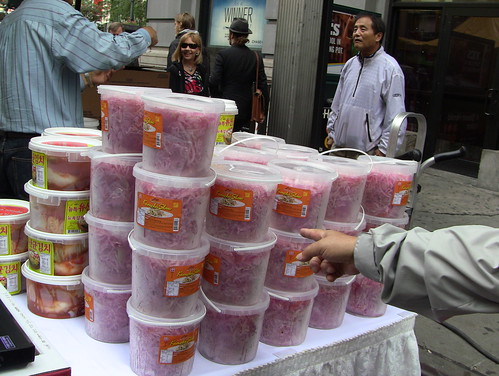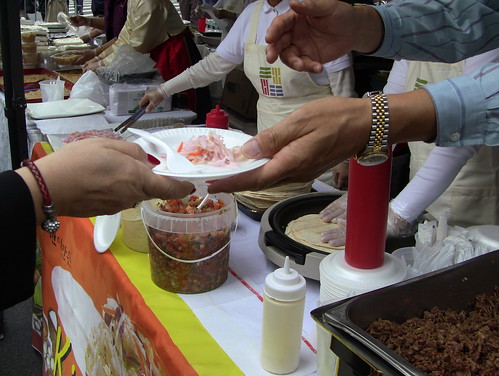Making Kimchi, a traditional Korean pickled cabbage dish, is tough; selling it in New York and making a profit is even more challenging, especially in the midst of what analysts are now calling an economic double dip recession.
With restaurant sales in the city down by 2.9 percent last year according to the National Restaurant Association, and with about 72 percent of New Yorkers concerned about their food bills, it is a tough time to be in the food business. In the last two years two highly successful food truck businesses have bucked the trend by pioneering the fusion of American and Mexican foods with Kimchi and Korean BBQ.
“A lot of people love the kimchi. We have a couple customers a day who buy only the kimchi,” said Richard Kim, 28, an employee at Kimchi Taco Trucks. The truck’s daily income ranges from $1000 to $2000 a day. The employees wear shirts with the dictionary definition of kimchi, pronunciation included, to familiarize the American public with this pickled vegetable garnished with peppers and garlic.
Edward 3D Song, founder of Korilla Trucks, is credited with kicking of the trend in October of 2010, immediately turning things around for the city’s Kimchi business. Kimchi Taco Trucks followed in March 2011. “ Eddie is a very good business guy,” gushed Sang Jin Kim, 65, head of New York Kimchi Co. about Song. New York Kimchi provides Kimchi for both Korilla Trucks and high-end restaurants on Korea Way and Flushing.
Although Kimchi fusion experiments have popped up in the city before – New York Hot Dog and Coffee in the Village tried Kimchi hot dogs and TJPizzeria in Flushing adding Kimchi as one of its toppings – the key to success this time around seems to be the trucks. Food trucks have provided the American public with a cheap alternative to eating out in times of economic hardship. Food truck sales have seen a 7.6 percent rise in 2010, according to Sageworks Inc., which analyzes private business.
“Korean food became popular in America about 4 to 6 years ago and, lately, trucks are also popular so it’s a really good combination,” said Richard Kim.
Despite their newness to the city’s food truck scene, both Korilla Trucks and Kimchi Taco Trucks have gathered a considerable following with their offerings of Kimchi on burritos, tacos, and steaks. “People can come back to the truck and not get the same food every day. That’s why we have repeated customers,” said Kim pointing out their varied food menu.
The popularity of the Kimchi trucks is remarkable considering it is a delicacy that cooks often take pride in making themselves. Typically, Korean restaurants in Flushing produce their own fresh kimchi daily or weekly and can sell it for up to $40 dollars a box. Both Hong Kong Supermarket on Main Street and World Mallon Roosevelt Avenue, Flushing sell imported Kimchi from Kimchee Pride, Inc. for $10.99 a half gallon.
New York Kimchi Co. has established a major presence hawking kimchi at the big Korean events in the city including Korea Day in Central Park and the National Korea Day Parade on Korea Way. At the National Korea Day Parade on Oct. 1, New York Kimchi sold approximately 175 gallons of Kimchi between 11am and 3:30pm for $10 dollars a half-gallon. The prices of their Kimchi coleslaw were also reduced to $5 from $9 for the event.
“We think about people’s health,” said New York Kimchi’s Sang Jin Kim in reference to their specially devised Kimchi rich with added lactobacillus for a better clearing of the digestive track. New York Kimchi also provides 3 hospitals in Flushing with their Kimchislaw, a healthier alternative to coleslaw. “Health is more important than anything, even than taste.”


